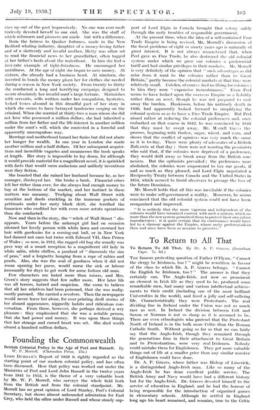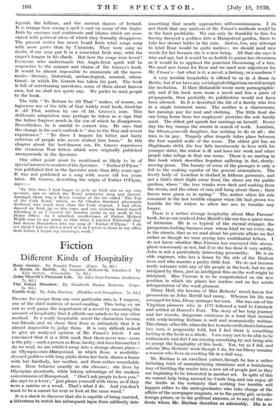To Return to All That
THE famous protesting question of Father O'Flynn, " Cannot the clergy be Irishmen, too ? " might be rewritten in favour of the class to which Dr. A. P. Graves belongs. " Cannot the English be Irishmen, too ? " The answer is that they certainly can. The Anglo-Irish, not now so prominent an element in Irish life as they used to be, produced some remarkable men, had many and various intellectual achieve- ments to their credit (including one of the most brilliant Universities in the world), and lived a jolly and self-sufficing life. Characteristically they were Protestants. The real dividing line in Ireland under the Union was not so nuich race as sect. In Ireland the division between Celt and Saxon or Norman is not so sharp as it is assumed to be. There are even ethnologists who pretend that the Protestant North of Ireland is in the bulk more Celtic than the Roman Catholic South. Without going so far its that we can fairly say that the Anglo-Irish, though they remained through the generations firm in their attachment to Great Britain and to Protestantism, were very real Irishmen. Nobody could mistake them for Englishmen. They got more valuable things out of life at a smaller price than any similar number of Englishmen could have done.
Dr. A. I'. Graves, whose father was Bishop of Limerick, is a distinguished Anglo-Irish man. Like so many of the Anglo-Irish he has done excellent public service. The British Army and Navy would have had a different history but for the Anglo-Irish. Dr. Graves devoted himself to the service of education in England, and he had the honour of being responsible for the introduction of organized games in elementary schools. Although he settled in England long ago his heart remained, and remains, true to the Celtic legends, the folklore, and the ancient dances of Ireland. It is strange how strong a spell is cast on many of the Anglo- Irish by customs and sentiments and idioms which are asso- ciated with political ideas of which they formally disapprove. The present writer loss never heard Irish rebel songs sung with more gusto than by Unionists. They were sung no doubt, if one may put it in a somewhat Irish way, with the singer's tongue in his cheek. But how the songs were loved ! Everyone who understands this Anglo-Irish spirit will be responsive to the manner and charm of Dr. Graves's book. It would be almost impossible to enumerate all the move- ments—literary, historical, archaeological, musical, educa- tional—in which Dr. Graves has taken his part. The book is full of entertaining anecdotes, some of them about famous men, but we shall not quote any. We prefer to send people to the book.
The title " To Return to All That " makes, of course, an ingenious use of the title of that widely read book, Good-bye to All That, written by one of Dr. Graves's sons. This deliberate adaptation may perhaps be taken as a sign that the father forgives much in the son of which he disapproves. Nevertheless, he is careful to correct him. He says that the change in his son's outlook is " due to the War and recent experiences." " To these I impute his bitter and hasty criticism of people who never wished him harm." In this chapter about his best-known son, Dr. Graves reproduces the vivacious War letters which were originally published anonymously in the Spectator.
One other point must be mentioned as likely to be of special interest to readers of the Spectator. " Father O'Flynn " was published first in the Spectator more than fifty years ago. It was not published as a song with music till ten years later. Dr. Graves, describing the origin of Father O'Flynn, says :-
"By this time I had begun to pick up Irish sirs on my own account, airs to which- the Kerry peasantry sang and danced. Amongst those was a Kerry version of the air called ' The Top of the Cork Road,' which, as Sir Charles Stanford afterwards declared, was much finer thou the Cork original. I had often danced an Irish jig to this tune, and one morning found myself whistling it as I crossed the London parks to my work in the Home Office. As I whistled, recollections of Father Michael Walsh rose to my mind, so that when I reached Whitehall they had woven themselves into my song of ' Father O'Flynn.' I do not think I had to alter a word of it as I wrote it down at my office desk before I began my morning's work."

















































 Previous page
Previous page